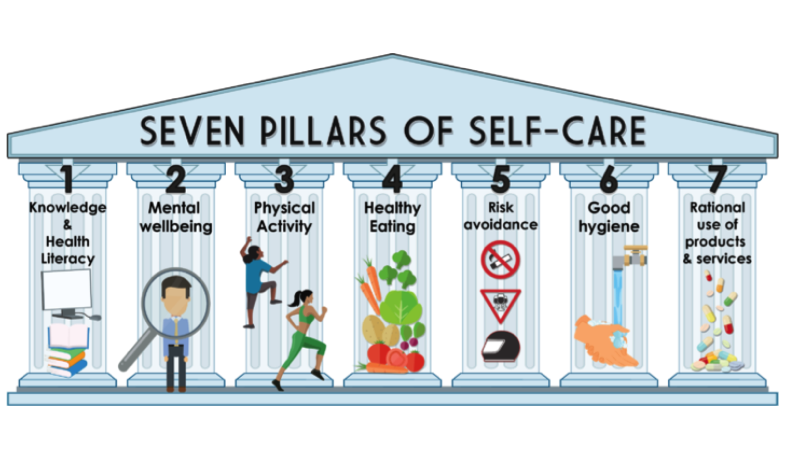Self-Care is not just a cliche. We need it this year more than ever.

Working in our industry, we should know by now that we should take care of ourselves in order to provide safe and quality care to our residents.
It’s not unusual for any profession to experience busy periods. Whether it’s the morning rush assisting residents with daily living, tight deadlines, or new projects, these situations can create both stress and excitement for employees. We might have overcome the challenges of the pandemic yet issues such as insecurity and climate change are currently affecting all of us. It is getting harder and harder to achieve a good balance between work and life.
As individuals, we are responsible for our own health. But with more issues and challenges, it is very hard to find the time to do self-care. Workplaces can play an essential part in promoting positive mental health and by giving importance to psychological health and safety. This month, we are highlighting the importance of self-care.
According to the World Health Organization, June 24 marks the start of Self-Care Month, which ends with Self-Care Day on 24 July. This symbolic day was chosen because self-care can be practiced “24 hours a day/7 days a week”. It’s also International Self-Care Day on July 24! Learn more about this celebrated day!
What are the Barriers to Self-Care?
1. Increasing workload
They have called it the great resignation. More people are experiencing burnout in our industry and this creates a vicious cycle. Staffing shortages and rising demands on workers’ time leave them more vulnerable to burnout, make it harder to nurture supportive connections with peers, and increase the likelihood of moral distress.
2. Unhealthy work culture
More and more workers are normalizing overworking and getting more overtime on their supposed days off. This could be due to staffing shortages and economic or financial issues. The workplace needs to encourage a good work-life balance and for workers to detach themselves from the demands of their job.
3. Stigma and False Beliefs
There is still a lot of stigma around mental health. Here are the most common myths and misconceptions according to the Mental Health Commission of Canada. With most adults spending more of their waking hours at work than anywhere else, addressing mental health issues at work is vitally important.
4. There is no psychological health and safety program for workers
Clear policies and procedures that protect workers from moral distress and encourage self-care promote a positive environment with healthy workers.
What can I do?

It is easy to forget and get lost in the sea of tasks and expectations from both our work and our lives. One very effective way to put self care into practice is to do a daily or regular self-check using the mental health continuum. Knowing where you stand in the continuum would allow you to be self aware of your own mental health and take action to prevent mental illness or burnout.
Remember to practice the 7 pillars of self-care regularly. Follow the framework developed by the International Self-Care Foundation to ensure that all aspects of self-care are covered and to maintain a holistic approach to self-care.
If you work in Long Term Care, you can also take some courses that would enhance your coping skills and increase resilience such as The Working Mind for LTC Workers.
What can employers do?
Unhealthy employees are not good for business, employers can implement a lot of different strategies to encourage workers to practice self-care and provide them with a safe and healthy work environment.
If employers want healthy, environmentally safe, energetic and clean workplaces they need to encourage, model and practice self-care. If employers want the same for their employees (why wouldn’t they), they need to be supportive of employees taking time to care for themselves as well!
Check out these articles/resources:
- “Why Self-Care Matters for Both Employers and Employees” from Heartmanity’s Blog, looks at how self-care is a lifestyle, not just a spa day!
- CCOHS OHS Answers Fact Sheets about fatigue looks at workplace and how to address.
- Workplace Strategies for Mental Health has free resources on topics such as mental health awareness and healthy break activities.
- Mental Health Commission of Canada has all the information about following the National Standard for Psychological Health and Safety.
- Read more about Self-Care from other organizations.
- If you work in Long Term Care, you can also take some courses that would enhance your coping skills and increase resilience and support your employees such as The Working Mind for LTC Managers.
